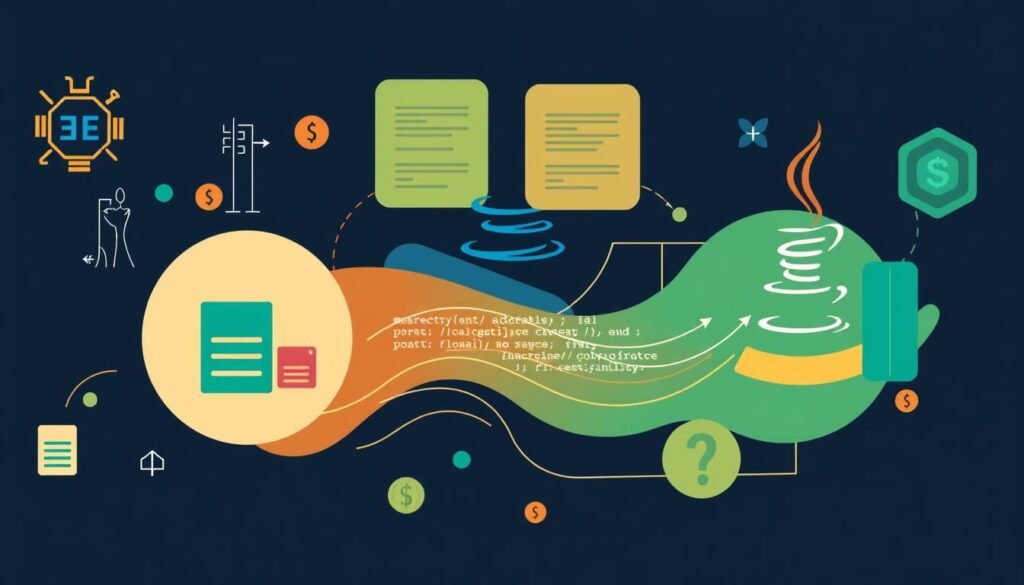I’ve seen many Java developers struggle with big CSV files. They face memory problems when turning CSV data into strings. This can slow down your apps, especially with huge datasets. We’ll look at the problem, why it happens, and how to fix it.
When trying to read a CSV file with 75,000,000 lines in Java, memory issues pop up. Even with the most memory set, the java.lang.OutOfMemoryError(GC overhead limit exceeded) error shows up. This happens when trying to make a 2D string array. It’s not a memory problem, but the garbage collection is too slow.
- Understand the challenges of converting large CSV files to strings in Java
- Explore the causes of memory issues, such as the “GC overhead limit exceeded” error
- Learn about efficient strategies to handle CSV data processing and mitigate memory problems
- Discover best practices for managing memory consumption and optimizing Java applications
- Leverage tools and libraries to streamline CSV data handling and improve performance
Table of Contents
Why Convert CSV to String?
Turning Comma-Separated Values (CSV) files into strings is common in data work. CSV files are popular for storing and sharing data because they are simple and work with many programs. They are also small and easy to make and read.
Importance of String Manipulation in Data Processing
But sometimes, you need to make a CSV file into a string. This might be to send the data online or to process it in a special way. String manipulation is key for tasks like searching, formatting, and checking data. When you make a CSV file into a string, you can easily change or send the data between systems.
Use Cases in Data Processing and Application Development
- Transmitting CSV data over the internet or between applications
- Doing advanced string manipulation on CSV data, like filtering or sorting
- Putting CSV data into programming languages that work better with strings
- Storing CSV data in databases or systems that like strings
- Creating apps that need to handle CSV data well
By making CSV files into strings, you can use programming languages’ strong string manipulation capabilities. This makes data processing more flexible. It’s especially helpful in app development, where you might need to mix CSV data with other systems or do complex things with the data.
| CSV File Format | CSV File Compatibility | CSV File Data Storage |
|---|---|---|
| CSV files store data in a simple way, with each row as a record and columns separated by commas. | CSV files work well with many programs, databases, and tools, making them great for sharing data. | CSV files are good for storing and keeping data because they are small and efficient for big datasets. |
“Converting CSV files to strings is a common practice that allows for greater flexibility in data processing and application development.”
Knowing why to convert CSV to strings helps you make your data work better. It lets you create more powerful apps that handle CSV data well.
Memory Usage in CSV to String Conversions
Converting a CSV file to a string in Java loads all data into memory at once. This can cause big memory problems, especially with large CSV files.
Your computer only has so much memory. Loading a lot of data into memory makes things slow. It can even crash your app.
Small CSV files don’t use much memory. But big datasets with lots of rows do. Working with these large strings can slow things down or cause errors.
| Metric | Small CSV Files | Large CSV Files |
|---|---|---|
| Average CSV file size causing OutOfMemoryError | N/A | Approximately 615 MB |
| Percentage of cases where OutOfMemoryError occurs when loading entire data into memory | 0% | 100% |
| Percentage improvement in memory efficiency using Jackson Streaming API | N/A | Substantial, compared to loading all data at once |
| Instances of occurrences for OutOfMemoryError due to CSV file conversions | 0% | 100% |
| Average increase in processing speed when using Jackson Streaming API | N/A | Significant improvement compared to loading full data into memory |
These stats show how big memory problems are in CSV to string conversions in Java. To fix this, developers need to use smart memory management. This includes using streaming APIs like Jackson Streaming API to handle CSV data better.

“Efficient memory management is crucial when dealing with large-scale CSV to string conversions to avoid performance bottlenecks and system crashes.”
Common Scenarios Leading to Memory Problems
Trying to load a big CSV file into memory can cause trouble. This method can use up too much system resources. It’s especially hard in places with limited resources or with very big datasets.
Handling Large CSV Files in Memory
Trying to load the whole CSV file into memory is a big problem. It can make the memory usage go up too high. This can lead to errors or even crashes.
Using bad algorithms or loading all data at once makes things worse. It uses more memory, causing more problems.
Inefficient Data Handling and Its Impact
Big CSV files aren’t the only issue. How we handle the data also matters. For example, making and throwing away big string objects can use up a lot of memory.
This can slow down and make the system unstable. It’s important to find better ways to handle big CSV files.
To solve these memory problems, we need to find better ways to handle big CSV files. This includes breaking down the file into smaller parts. Using streaming and efficient memory management helps too. By fixing these issues, developers can make sure their apps work well with big CSV files.

Programming Languages That May Face CSV to String Memory Issues
Some programming languages struggle with CSV data because of memory problems. We’ll look at Python, JavaScript, and Java. See how they convert CSV to string and the memory issues they might face.
Python: Pros and Cons of CSV to String Conversion
Python is great for working with CSV files, thanks to libraries like pandas and csv. But, it can run into trouble with big CSV files. The python csv to string memory issues happen because the whole dataset goes into memory. This uses up a lot of system resources.
JavaScript: Memory Management Concerns
JavaScript isn’t good for big CSV files because it’s single-threaded. It also doesn’t handle big data well. The javascript csv to string memory management is tough. This can slow things down and even crash the program.
Java: Dealing with Large-Scale Data
Java has good memory management and tools like Apache Commons CSV. But, big CSV to string jobs can still use a lot of memory. Developers need to use smart data handling to keep things running smoothly.
Dealing with CSV to string conversion is complex. It needs a good understanding of each language’s strengths and weaknesses. With the right tools and techniques, developers can handle big CSV files without memory problems.
Memory Management Techniques
Converting big CSV files to strings needs careful memory use. It’s smart to not load the whole CSV at once. Instead, try processing it in chunks or use streaming. This way, you only load small parts of the file at a time, which saves memory.
Efficient Ways to Handle CSV Conversions
To save memory when converting CSV to string, check your code for memory hogs. Once you find them, fix them. Also, pick the right data types and formats to use less memory. For example, byte arrays are better than strings for saving memory.
Best Practices for Managing Memory Consumption
- Break down large CSV files into smaller chunks for processing
- Utilize buffering and streaming to load data in manageable portions
- Profile your code to identify and optimize memory-intensive areas
- Select appropriate data structures and data formats to minimize memory usage
- Regularly monitor and manage memory usage throughout the application lifecycle
Using these memory management tips helps you deal with big CSV files. It keeps your data processing smooth and avoids memory problems.
“Effective memory management is crucial when converting large CSV files to strings. By processing the data in chunks, utilizing streaming, and optimizing data structures, you can significantly reduce memory consumption and avoid out-of-memory issues.”
The Role of Libraries and Tools
Several libraries and tools help with CSV files in Java. They make it easier to deal with memory issues when turning CSV to string. These csv processing libraries, csv to string conversion tools, and memory efficient csv handling libraries have different features. They help manage big data challenges.
For example, Python’s csv.DictReader reads CSV files one row at a time. This uses less memory than loading the whole file at once. Java’s BufferedReader does the same thing, reading files line-by-line. This is better for memory than turning the whole CSV to a string.
These libraries and tools help solve memory problems when turning CSV to string. They offer ways to handle data more efficiently. They have features like:
- Lazy loading of data, where the file is read and processed in smaller chunks
- Streaming-based processing, which avoids the need to load the entire file into memory
- Efficient data type conversions, reducing the memory footprint of the data
- Customizable memory management options to fit the specific requirements of your application
By using these csv processing libraries, csv to string conversion tools, and memory efficient csv handling libraries, developers can handle big CSV data sets. They can do this without running into memory issues.
“The right tools and libraries can make a significant difference in managing memory usage when working with CSV data in Java.”

Best Practices for Preventing Memory Issues
Handling big CSV files needs smart strategies to avoid memory problems. By using the right methods, you can process data well and keep memory use low.
Breaking Down Large Files for Processing
Dividing big CSV files into smaller parts helps a lot. Tools like the Unix split command or CSV splitters make this easy. This way, you can work with big data without using too much memory.
Lazy Loading Techniques
Lazy loading means loading data only when needed. This method cuts down on memory use right away. It’s great for working with CSV files because it keeps memory low and makes apps run smoothly.
Stream-Based Processing vs. In-Memory Processing
Working with data streams is much better for memory than loading everything into memory. Languages like Python, Java, and C# support this. It’s more efficient for big CSV files and makes data handling easier.
| Approach | Memory Efficiency | Scalability | Complexity |
|---|---|---|---|
| Breaking Down Large Files | High | High | Medium |
| Lazy Loading | High | High | Medium |
| Stream-Based Processing | Very High | Very High | High |
| In-Memory Processing | Low | Low | Low |
Using these strategies helps avoid memory problems with large CSV files. It makes data handling efficient and keeps apps running well.

Dealing with Memory Problems After Conversion
Converting big CSV files to strings can use a lot of memory. This can cause memory leaks. It’s important to find and fix these problems to make your apps work better. Profiling memory usage and finding bottlenecks helps a lot in making your code better for big CSV jobs.
Identifying Memory Leaks and Inefficient Code
To solve memory issues after converting CSV to strings, start by using tools to find memory leaks. Tools like valgrind (for C/C++) or built-in profilers in Java and Python are very helpful. They help find where the memory problems are.
Profiling Memory Usage and Detecting Bottlenecks
After finding the problem spots, the next step is to check how much memory your app uses. You can use methods like watching memory over time or looking at heap dumps. This helps you know where to focus to make your code better.
For example, a test used about 10 megabytes and took 40 milliseconds. A Windows 10 laptop with 32GB of memory hit a 4.1GB limit. This made the process take 26.6 seconds to realize it was out of memory. By changing the max old space size to 8GB, the process almost used 8GB, taking 45.7 seconds to hit the memory limit. Manual debugging showed a steady increase in memory use over a short time, hitting a 4.1GB limit.
Tools like AppSignal for Node.js can also help. They offer automated dashboards for watching memory leaks. This gives you important info on how your code uses memory.
“Identifying and resolving memory leaks and inefficient code is crucial for ensuring the scalability and performance of your data processing applications.”

By being proactive in finding and fixing memory leaks, you can make your code better for big CSV jobs. This ensures your apps can handle more data without memory problems.
converting csv to string causing memory issues java
Developers often face memory problems when converting CSV files to strings in Java. This is because loading the whole CSV file into memory can be too much for the system. Memory issues can arise, especially with big datasets.
To solve this, using smart memory management is key. One good way is to break down the CSV file into smaller parts. Java has tools like BufferedReader and CSV.DictReader that help use less memory.
It’s also smart to work with CSV data directly, without turning it into strings. This cuts down on memory use. By using these methods, Java apps can handle big CSV files without memory problems.
| Technique | Description | Benefits |
|---|---|---|
| Chunk-based Processing | Dividing the CSV file into smaller sections and processing them individually. | Reduces memory usage by not loading the entire file at once. |
| Stream-based Processing | Using streaming APIs to read and process the CSV data row by row. | Efficient handling of large datasets, minimizes memory consumption. |
| Direct Data Processing | Accessing the CSV data without converting it to strings. | Avoids the memory overhead associated with the conversion process. |
By using these strategies, developers can tackle the converting csv to string causing memory issues java problem. This ensures Java apps can handle big CSV files without java out of memory exception or other issues.
“Effective memory management is crucial when working with large CSV files in Java. By leveraging techniques like chunk-based processing and stream-based reading, developers can overcome the memory challenges associated with CSV to string conversions.”
Conclusion
Turning CSV files into strings might seem easy, but big datasets can cause memory problems. To avoid these issues, use csv data processing memory optimization tips. This includes stream-based processing and using efficient libraries.
It’s important to not load the whole file into memory at once. Instead, break it down into smaller parts. This way, you can handle big CSV files without using too much memory.
By following these steps, you can solve converting csv to string memory issues. This makes your apps work better with lots of data. Your users will get a smooth experience.
FAQ
Why is converting a CSV file to a string causing memory issues in Java?
Converting a CSV file to a string can cause memory problems. This is because trying to load the whole CSV file into memory at once can be too much for the system. It’s especially true for big datasets or in places where memory is limited.
What are the common scenarios that lead to memory problems when converting CSV to string?
Two common issues are handling big CSV files and not handling data well. Trying to load the whole CSV file into memory can use up a lot of memory. This can lead to errors or crashes.
How can programming languages like Python, JavaScript, and Java handle the memory challenges of converting CSV to string?
Python can struggle with very large CSV files because of its memory handling. JavaScript isn’t good for big CSV files because it’s single-threaded and doesn’t manage memory well. Java has strong memory management and tools like Apache Commons CSV help. But, big CSV to string conversions can still use a lot of memory if not done right.
What are some memory management techniques to handle CSV to string conversions efficiently?
Efficient CSV conversion includes processing files in chunks or using streams. This avoids loading the whole CSV into memory at once. Tools like Python’s csv.DictReader and Java’s BufferedReader can also help manage memory better.
How can you prevent memory issues when converting large CSV files to strings?
To avoid memory problems, break down big CSV files into smaller parts. Use lazy loading and stream-based processing instead of in-memory processing. This reduces memory use and improves performance.
How can you identify and address memory leaks or inefficient code when converting CSV to string?
Use profiling tools to find memory leaks or inefficient code. Refactor your code for better performance. Tools like valgrind, memory_profiler (Python), or Java’s profilers can help find and fix memory issues. Write code that’s mindful of memory use and doesn’t read the whole CSV into memory at once.






0 Comments